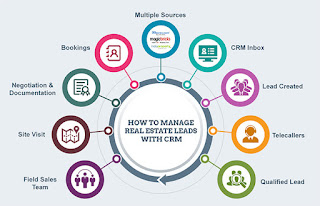Help Streamlines Operations
 |
| source google |
Several features and capabilities of Real Estate CRM
- Data importing from whichever digital source is supplying lead information, preferably on an automated or scheduled basis.
 |
| source google |
- Efficient data entry if your operation inputs lead information manually, which should include customized Real estate CRM software forms that data entry personnel can fill out, associate with a client, and way to an appropriate central location in which data is stored and managed.
- Pipeline management, which at the least should let managers track which salespeople are working on the most leads and how many deals are closing.
- Many real estate operations require input from multiple executives in the organization, so the system should be able to route deal information and alerts automatically as well as on an ad hoc basis.
- Real estate CRM Role-based access and security to let managers see leads before sales staffers do and route them appropriately.
Focus on Data and Reporting
 |
| source google |
Another important place that Real estate CRM
platforms should focus on is data and reporting. Depending on what kind of
operation you're running, you'll need to attach different sorts of customer
information to a given CRM entry. Small operations can be satisfied by filling
in a series of fields in software form that eventually become database entries
in CRM. But, most operations will need to attach third-party records and
documents to customers and deals. Commercial operations might attach copies of
articles of incorporation, employee lists, and commercial tax information. Real
estate CRM Developers will likely require localized documents such as
inspection records, zoning forms, and similar documents. Exactly what documents
will be required is subject to what kind of operation you're running and the
laws that govern the locale in which you're doing business.




No comments:
Post a Comment